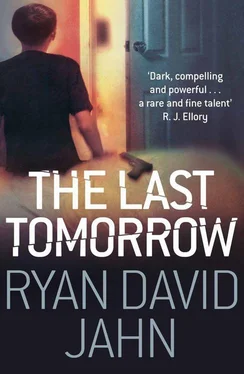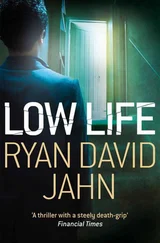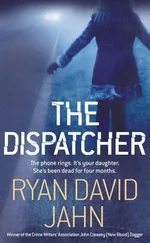Ryan Jahn - The Last Tomorrow
Здесь есть возможность читать онлайн «Ryan Jahn - The Last Tomorrow» весь текст электронной книги совершенно бесплатно (целиком полную версию без сокращений). В некоторых случаях можно слушать аудио, скачать через торрент в формате fb2 и присутствует краткое содержание. Год выпуска: 2012, ISBN: 2012, Издательство: Macmillan Publishers UK, Жанр: Триллер, на английском языке. Описание произведения, (предисловие) а так же отзывы посетителей доступны на портале библиотеки ЛибКат.
- Название:The Last Tomorrow
- Автор:
- Издательство:Macmillan Publishers UK
- Жанр:
- Год:2012
- ISBN:9780230766501
- Рейтинг книги:4 / 5. Голосов: 1
-
Избранное:Добавить в избранное
- Отзывы:
-
Ваша оценка:
- 80
- 1
- 2
- 3
- 4
- 5
The Last Tomorrow: краткое содержание, описание и аннотация
Предлагаем к чтению аннотацию, описание, краткое содержание или предисловие (зависит от того, что написал сам автор книги «The Last Tomorrow»). Если вы не нашли необходимую информацию о книге — напишите в комментариях, мы постараемся отыскать её.
The Last Tomorrow — читать онлайн бесплатно полную книгу (весь текст) целиком
Ниже представлен текст книги, разбитый по страницам. Система сохранения места последней прочитанной страницы, позволяет с удобством читать онлайн бесплатно книгу «The Last Tomorrow», без необходимости каждый раз заново искать на чём Вы остановились. Поставьте закладку, и сможете в любой момент перейти на страницу, на которой закончили чтение.
Интервал:
Закладка:
This man, just shy of six feet tall, taps an Old Gold cigarette from its crushed packet, lights it, and walks to his Divco milk truck, all white but for the fenders painted light blue, and, on the side of the truck, also in blue, the words,
H.H. WHITE CREAMERY CO.
In Business Since 1912.
In business since the year this man, this milkman, Eugene Dahl, was born. In business for fourty years. In business since milk was delivered by horse and carriage.
He steps into the truck and gets it started. He pumps the gas pedal to keep it running while the four-cylinder engine warms up. It takes a few minutes.
While he waits for the engine to start running smoothly he smokes his cigarette and looks out the windshield at his quiet street.
He spits a bit of tobacco off the end of his tongue.
It’s hard to believe this is where life has brought him: to a finicky milk truck in front of his one-bedroom apartment just west of downtown Los Angeles. Once he thought he was going to be something.
Once he almost was.
2
After a childhood of squalor in rural Kentucky, living in a shack with a dirt floor about thirty miles outside of Elizabethtown, surviving only on the meat he and his father could shoot — deer, wild turkey — Eugene made his way to New York to become a writer. He rented a room in Red Hook and got a job in construction. His skills were limited, but he could swing a hammer. After work he’d go home, sit at the typewriter with a glass of whiskey on the table in front of him, and bang out stories with titles like ‘Planet 17’ and ‘The Black Ooze Had a Name’. Sometimes they’d sell to Astounding Stories or Weird Tales and he’d get a check for twenty or fourty bucks.
Usually they wouldn’t.
Every once in a while he pretended to work on a novel.
Then, in 1938, he got an idea for a comic book.
He’d spent many a Sunday in his youth learning to draw by copying the funnies, and later by writing and drawing comics to hand out to his friends, so, though he was out of practice, he thought he might have enough ability left in him to create on paper what existed as yet only in his mind.
It turned out he was right.
He spent hours writing and drawing after work. He checked out anatomy books from the library to help him, and books on architecture, and books on animal life. He almost always found an image that could work as a reference when his abilities or his imagination failed him, as they often did. If he couldn’t find a reference, or if something was simply beyond him, he drew around the problem.
It took him months to finish, months hunched over his small table after long days of swinging a hammer in the sun. He worked with aching muscles. He worked with blood-blisters throbbing on his fingers. He worked with gashes in the backs of his hands. Then one day he looked up and was finished. He had four seven-page stories written and drawn, and, as far as he was concerned, ready to be printed up and put on newsstands.
It was a superhero comic.
His superhero was called Rabid, but Donald ‘Don’ Coyote was the name of the man behind the mask. He was a bookstore clerk who spent his days and nights lost in tales of adventure. He lived with his mother, had a cat named Meow he fed every morning, had a crush on a girl at work he was afraid to ask out.
The first story began with Don Coyote being bitten by a rabid dog as he walked home from work. Over the next several days he changed. His cat noticed the difference before he did and began hissing at him when he walked by. Then his hearing improved. High-pitched sounds began to bother him. His teeth grew long and sharp. He began to crave raw beef, and eat it with his bare hands. His muscles doubled in size.
Then he went to work and learned that the girl he liked, Sue, had been mugged the night before. He asked where she’d been mugged and what the fellow looked like. That night he went hunting. He found the man who stole Sue’s purse and recovered it. Then he beat the mugger to a pulp and left him on the front steps of the police station with a note pinned to his shirt.
After creating his superhero and spending two stories developing him, Eugene introduced the villain who was to become Don Coyote’s arch nemesis.
His name was Reginald Winthrop. He was a heartless businessman whose plane had crashed on a remote island. For months he was presumed dead. His brother took over his business, married his wife. But Reginald wasn’t dead. After the crash, a witch doctor found him in the wreckage and nursed him back to health. He’d lost an arm in the crash, but the witch doctor replaced it with an airplane propeller.
He returned to the city. But he was no longer Reginald Winthrop. He now called himself the Windmill. When he tried to reclaim his old life, his brother had him declared insane. He was put into an asylum, but could not be contained. He broke out, smashed the wall to smithereens with his propeller arm — and anyone who got in his way. He went after his brother, demanding his wife and business back. His brother broke down crying and admitted he’d lost all the money. His wife refused him. The Windmill burned down their house with them inside it. He started robbing banks, convinced he could rebuild his empire. He just needed a little capital.
At the end of the last story, Don Coyote, while walking home from work, turned a corner and saw the Windmill leaving a bank with a sack of money hanging from his fist. The Windmill turned on him, propeller spinning. Don stepped back. The Windmill raised his propeller arm and took to the sky like a helicopter, escaping. Don Coyote went into the bank to make sure everyone was all right. His mother was there. She’d been killed, sliced to pieces. Don Coyote swore to himself then and there, and to his dead mother, and to God, that he would stop the Windmill at all costs.
Even if it was the last thing he ever did.
Eugene was immoderately proud of his creation. He flipped through the pages again and again, looking at it. He’d worked harder on this comic book than on anything else he’d ever done. He believed it might be his escape from poverty.
He knew people liked to say that in America anyone could do anything. With enough hard work a man born in the gutter could become a millionaire, or president. But the truth for most people was different. Poverty was a room with no doors. There were windows, you could see outside, but the windows didn’t open. If you hoped to escape you had either to break through the glass and into a life of crime or else dream a doorway into existence. If you could do neither of those things you’d be stuck in that room no matter how hard you worked. He believed Rabid! might be his doorway, and he planned to walk through it if he could.
The day after he finished the comic, he took the train into the city, determined to find a publisher. The first two weren’t interested. Then he walked into the offices of E.M. Comics on 42nd Street. After waiting for twenty minutes he was called into the publisher’s office. The publisher’s name was Michael Leonard. He was a thin man with prematurely gray hair, a nose like a snowplow, and a loose-skinned neck.
Eugene’s stomach was a knot of anxiety.
He handed the pages over.
Leonard flipped through them quickly, like someone browsing a catalogue with nothing of interest in it. Seeing Leonard scan the pages, seeing his bored expression, Eugene prepared himself for rejection. He prepared himself for another no, sorry, it just ain’t our thing. He started thinking about where he might go next. He’d made a list of comics publishers before leaving the house. As soon as he was down on the street again, he’d look it over, see what was close by.
But when Leonard flipped the last page he looked up and said, ‘Not bad. I’ll give you two hundred bucks for the idea, twenty bucks a story, and fifteen dollars a page for the art. I’ll tell you now you aren’t getting your own book right away. We’ll run these four stories in the next few issues of Bash! Comics , see if the kids respond to them. If they do we’ll think about it. And work on your drawing. You’re at the back end of good. Improve a bit and I’ll pay twenty bucks a page, but you ain’t there yet.’
Читать дальшеИнтервал:
Закладка:
Похожие книги на «The Last Tomorrow»
Представляем Вашему вниманию похожие книги на «The Last Tomorrow» списком для выбора. Мы отобрали схожую по названию и смыслу литературу в надежде предоставить читателям больше вариантов отыскать новые, интересные, ещё непрочитанные произведения.
Обсуждение, отзывы о книге «The Last Tomorrow» и просто собственные мнения читателей. Оставьте ваши комментарии, напишите, что Вы думаете о произведении, его смысле или главных героях. Укажите что конкретно понравилось, а что нет, и почему Вы так считаете.












